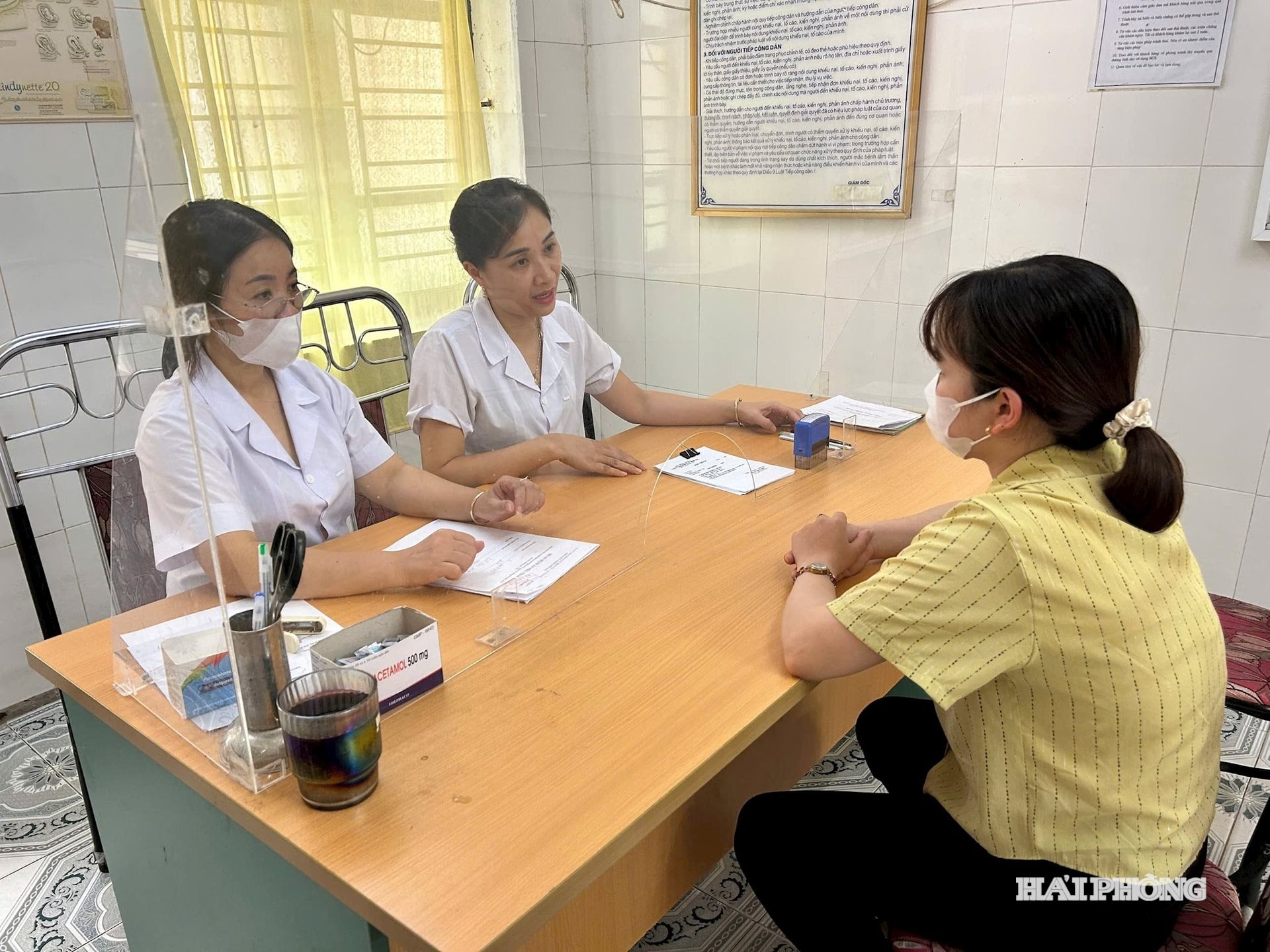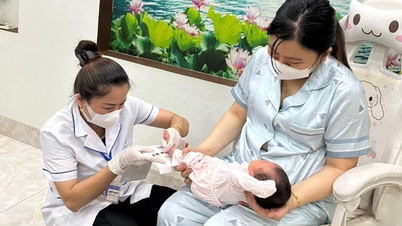
Timely intervention
During her 6th month of pregnancy, Ms. NTH (32 years old, Hai Duong ward) went for a check-up and discovered signs of high blood pressure and mild edema. These are the initial signs of pre-eclampsia, a dangerous complication during pregnancy if not monitored and treated promptly. Performing additional tests helps the doctor accurately diagnose the mild condition, thereby providing appropriate treatment for Ms. H.
Thanks to a low-salt diet, proper rest, and close weekly monitoring as directed by her doctor, Ms. H.'s blood pressure was effectively controlled. After 3 weeks, her blood pressure was stable, with no signs of worsening, and the fetus was developing well.
Recently, Ms. VTM (27 years old, Gia Loc commune) was 22 weeks pregnant and went for an ultrasound to screen for fetal abnormalities. After examination, the doctors discovered that the fetal heart had signs of abnormalities, suspecting ventricular septal defect - a type of congenital heart defect. Immediately after that, the doctor advised the patient to transfer to the Central Obstetrics Hospital to determine the exact condition of the fetus.
The diagnosis results confirmed that the fetus had a small ventricular septal defect, with a good prognosis, and did not require early intervention, but only regular monitoring, in case of any unexpected events, timely intervention would be required, so as not to affect the health of the fetus. This case shows the great significance of prenatal screening, especially fetal morphology ultrasound at the 22-week mark, helping to detect cardiovascular abnormalities early.
These are two of many pregnant women in the city who, when undergoing prenatal screening, discovered signs of disease that could affect the health of mother and baby, and were instructed to intervene promptly. Doctor Pham Thanh Tung, Deputy Head of the Department of Reproductive Health Care (CDC Hai Phong), informed that on average, the department performs examinations, ultrasounds, and prenatal screening tests for about 500 women each month. The activities aim to detect early the risk of abnormal pregnancy, congenital malformations, and maternal-fetal diseases, helping pregnant women receive treatment advice and safe monitoring right at the grassroots level.
In addition, pregnant women also choose reputable medical facilities in the area to perform prenatal examination and screening, especially at reputable hospitals, such as: Hai Phong Obstetrics Hospital, Hai Duong Obstetrics Hospital, general hospitals with obstetrics departments... Dr. Bui Quang Trung, Deputy Director of Hai Duong Obstetrics Hospital, said that in fact, pregnant women who are well cared for early have a significantly reduced rate of premature birth and complications during birth, and the baby also develops healthier.

Be proactive early
Prenatal screening is a process of examination and testing during pregnancy to determine whether the fetus is at risk of birth defects or other health problems due to genetic or chromosomal disorders. The main purpose is to help doctors detect abnormalities early to provide appropriate advice to pregnant women, thereby having a pregnancy care plan or preparing for treatment, minimizing consequences for the child after birth.
The benefits of prenatal screening include early detection of congenital abnormalities such as Down syndrome, Edwards syndrome, Patau syndrome and other genetic diseases. This helps parents to be best prepared mentally and financially if the fetus has abnormalities, and at the same time make informed decisions about continuing the pregnancy or appropriate intervention and treatment options. Some screening tests also help detect other health problems that may affect pregnancy such as gestational diabetes.
Associate Professor, Doctor Vu Van Tam, Director of Hai Phong Obstetrics and Gynecology Hospital, said that prenatal screening is an activity to ensure that a pregnant woman and a fetus are healthy, to give birth to a healthy future generation for the country. Therefore, pregnant women need to proactively undergo prenatal screening, even have to examine and detect their own diseases before pregnancy to prevent and stop the risk of diseases during the mother's pregnancy.
Currently, Vietnam is among the countries with high rates of Thalassemia (congenital hemolytic disease). Pregnant women are already anemic, and if the anemia is not detected and becomes severe, it is very dangerous for the health of mother and baby. Therefore, screening to manage a healthy pregnancy is very important.
Thus, prenatal screening not only helps detect fetal abnormalities and maternal diseases early, but also opens up opportunities for timely medical intervention, improving the effectiveness of pregnancy care. This is an important preparation step to ensure that each baby is born with a good health foundation, reducing the burden on the family and society. Therefore, pregnant women need to proactively have regular check-ups and choose reputable medical facilities for comprehensive consultation and monitoring throughout pregnancy.
NGOC THANHSource: https://baohaiphong.vn/sang-loc-truoc-sinh-giup-tre-khoe-manh-523873.html



![[Photo] Closing ceremony of the 18th Congress of Hanoi Party Committee](https://vphoto.vietnam.vn/thumb/1200x675/vietnam/resource/IMAGE/2025/10/17/1760704850107_ndo_br_1-jpg.webp)
![[Photo] General Secretary To Lam attends the 95th Anniversary of the Party Central Office's Traditional Day](https://vphoto.vietnam.vn/thumb/1200x675/vietnam/resource/IMAGE/2025/10/18/1760784671836_a1-bnd-4476-1940-jpg.webp)


![[Photo] Collecting waste, sowing green seeds](https://vphoto.vietnam.vn/thumb/1200x675/vietnam/resource/IMAGE/2025/10/18/1760786475497_ndo_br_1-jpg.webp)





































































































Comment (0)